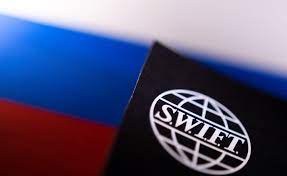
As Moscow intensifies efforts to address financial problems brought on by sanctions, the central bank reported on Friday that the reach of Russia's alternative to the SWIFT international messaging system has expanded at a record rate this year.
Following Russia's deployment of tens of thousands of troops into Ukraine, broad Western sanctions were imposed on many of the country's top banks, severely restricting their ability to access the international financial system. Global financial transactions are supported by SWIFT.
440 entities in total, of which more than 100 are non-residents, have joined Russia's alternative system this year, according to Alla Bakina, director of the central bank's national payment system department.
"The System for Transfer of Financial Messages has shown expansion this year because more foreign participants have joined," Bakina told a banking forum in Kazan.
"More participants joined the SPFS in the first half of the year than in all previous years of the system's existence," she said.
According to Bakina, the central bank does not publicly list the nations whose institutions have joined the SPFS.
Some banks in Russia still have access to SWIFT and can process payments going abroad, including branches of some foreign financial institutions that are currently prohibited from leaving Russia by recent Kremlin laws.
SWIFT is used by more than 11,000 financial institutions across more than 200 nations and territories.
The SPFS and Mir bank cards, which are Russia's alternatives to Visa and Mastercard, have seen an increase in use as a result of the sanctions; businesses that had previously stopped operating in Russia and cards that were issued there no longer functioned abroad.
According to Bakina, Mir cards now make up one-third of all bank cards in Russia.
Mir, which in Russian means "world" or "peace," is currently experiencing difficulties abroad. Following the most recent round of U.S. sanctions, banks in so-called "friendly" nations such as Turkey, Kazakhstan, Vietnam, and Uzbekistan stopped processing transactions involving the Mir cryptocurrency.
Vladimir Komlev, the head of the National Card Payments System, was added to Washington's list of sanctioned individuals, which led some foreign banks to withdraw their support.
The use of Mir cards is permitted in Cuba, South Korea, and a few former Soviet republics, but Komlev claimed on Thursday that the NSPK no longer makes public the list of nations that accept the cards.
(Source:financialpost.com)
Following Russia's deployment of tens of thousands of troops into Ukraine, broad Western sanctions were imposed on many of the country's top banks, severely restricting their ability to access the international financial system. Global financial transactions are supported by SWIFT.
440 entities in total, of which more than 100 are non-residents, have joined Russia's alternative system this year, according to Alla Bakina, director of the central bank's national payment system department.
"The System for Transfer of Financial Messages has shown expansion this year because more foreign participants have joined," Bakina told a banking forum in Kazan.
"More participants joined the SPFS in the first half of the year than in all previous years of the system's existence," she said.
According to Bakina, the central bank does not publicly list the nations whose institutions have joined the SPFS.
Some banks in Russia still have access to SWIFT and can process payments going abroad, including branches of some foreign financial institutions that are currently prohibited from leaving Russia by recent Kremlin laws.
SWIFT is used by more than 11,000 financial institutions across more than 200 nations and territories.
The SPFS and Mir bank cards, which are Russia's alternatives to Visa and Mastercard, have seen an increase in use as a result of the sanctions; businesses that had previously stopped operating in Russia and cards that were issued there no longer functioned abroad.
According to Bakina, Mir cards now make up one-third of all bank cards in Russia.
Mir, which in Russian means "world" or "peace," is currently experiencing difficulties abroad. Following the most recent round of U.S. sanctions, banks in so-called "friendly" nations such as Turkey, Kazakhstan, Vietnam, and Uzbekistan stopped processing transactions involving the Mir cryptocurrency.
Vladimir Komlev, the head of the National Card Payments System, was added to Washington's list of sanctioned individuals, which led some foreign banks to withdraw their support.
The use of Mir cards is permitted in Cuba, South Korea, and a few former Soviet republics, but Komlev claimed on Thursday that the NSPK no longer makes public the list of nations that accept the cards.
(Source:financialpost.com)














